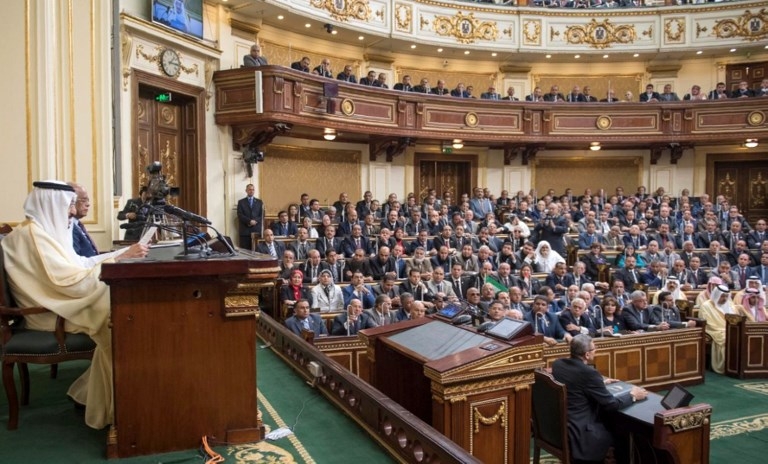Egyptian MPs opposed to handover of Red Sea islands sent on trip to US

A group of Egyptian MPs opposed to the transfer of two Red Sea Islands to Saudi Arabia are to miss a crucial parliamentary vote on the issue after being sent on a trip to the US, according to reports.
President Abdel Fattah al-Sisi's government announced last year a maritime demarcation accord with Saudi Arabia, which has given billions of dollars of aid to Egypt, ceding control of the Tiran and Sanafir islands to the Gulf kingdom.
The delegation included parliamentarians who were expected to vote against the accord, Arabic media reported.
According to Yahya Kazaz, a former leader in the Egyptian opposition movement Tamarud, the visit was arranged after the group of MPs expressed their refusal to support the decision to transfer the ownership, reported Arabi21.
"The parliamentarians invented this visit to the US in order to whitewash Egypt’s image and hold discussions about the Muslim Brotherhood," Kazaz was quoted as saying.
Kazaz said that the visit was merely arranged in order to keep the parliamentarians out of the country during the parliamentary discussions and vote on the matter.
The parliamentary legislative committee held three meetings between 11 and 12 June, according to Al-Monitor. The website said the committee did not however send its weekly meeting agenda to media outlets and only sent the schedule of general sessions. The decision was described as an unprecedented move in the history of parliamentary sessions.
One MP told Al-Monitor: "This might be the first step to making the meetings covert and unannounced to the media. The secret nature of the meetings has not been confirmed yet, but the committee head has the right to [make their proceedings secret] anytime.”
Journalists protest
Meanwhile, a group of 550 Egyptian journalists announced plans to hold a sit-in at the Egyptian Journalists’ Syndicate on Tuesday to protest the agreement to transfer the islands’ ownership to Saudi Arabia.
In a statement published on Sunday, the group of journalists called on Egyptian parliamentarians to “uphold their duties towards the Egyptian people by protecting the nation in the face of attempts to relinquish Egyptian lands,” reported Arabi21.
The journalists also announced that their sit-in would form part of a series of protest actions that would be used to peacefully demonstrate against any agreements to transfer Tiran and Sanafir’s ownership to the Gulf kingdom.
The news comes after Egypt announced on Sunday that will be keeping administrative control over the two Red Sea islands despite plans to transfer their ownership, according to a government report advising parliament on the terms of the agreement.
The report is the first indication Egypt intends to maintain some control over the uninhabited islands, whose transfer to Saudi Arabia sparked fury among many Egyptians and was declared illegal by an Egyptian court.
But the report was also regarded by Egyptians as a move by the Egyptian government to put the final touches on the demarcation of its maritime borders with Saudi Arabia to complete the islands’ transfer.
The government submitted the report to parliament to answer questions from lawmakers who had objected to the transfer, with some arguing that ceding territory amounted to treason.
"The agreement only ends (Egyptian) sovereignty and does not end the necessity of Egypt protecting this area for reasons of Egyptian and Saudi Arabian national security," the report said.
It said Egyptians would not need visas to visit and Cairo would maintain administrative control but not sovereignty over the islands, which are situated in the narrow entrance to the Gulf of Aqaba leading to Jordan and Israel.
Secret Netanyahu-Sisi meeting
The recent developments sparked angry reactions from Egyptians over social media, with the Arabic hashtag #Tiran_and_Sanafir_Are_Egyptian going viral.
Translation: Remember these faces well, for history will never forget how these treacherous parliamentarians clapped along as they sold our lands #Tiran_Sanafi_Are_Egyptian
Many social media users also cited reports in Israeli media on Monday that Israeli President Benjamin Netanyahu held a secret meeting in Cairo last year with Egyptian President Abdel Fattah al-Sisi to discuss the island transfer.
Leaked recordings revealed in February that Egyptian Foreign Minister Sameh Shoukry discussed with a top Israeli official the details of the contentious transfer of the two Egyptian islands.
Shoukry was heard in the recording discussing by phone the Egyptian side's negotiating position on the transfer and asking for Israel's support.
Israel gave its blessing in April to Egypt's return of the two Red Sea islands and Defence Minister Moshe Yaalon said that Riyadh had undertaken to respect relevant terms of the Israeli-Egyptian peace deal.
The agreement to transfer the islands’ ownership to Saudi Arabia announced in April 2016, caused a public uproar and rare mass protests by Egyptians, who insist that the uninhabited islands are Egyptian. They say their country's sovereignty over the islands dates back to a treaty in 1906, before Saudi Arabia was founded.
The government says the islands have always belonged to Saudi Arabia and that Egypt had merely administered them while on lease since the 1950s.
The plan was referred to the courts - irritating Riyadh and raising tensions between two major Arab states and traditional allies.
New MEE newsletter: Jerusalem Dispatch
Sign up to get the latest insights and analysis on Israel-Palestine, alongside Turkey Unpacked and other MEE newsletters
Middle East Eye delivers independent and unrivalled coverage and analysis of the Middle East, North Africa and beyond. To learn more about republishing this content and the associated fees, please fill out this form. More about MEE can be found here.





